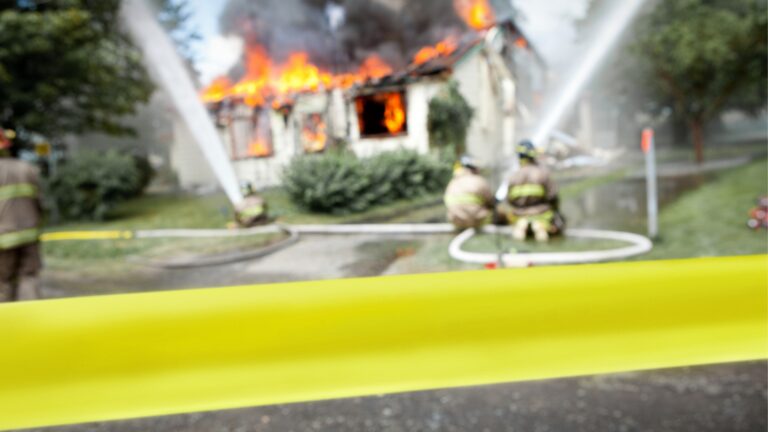How to Prevent House Fires & What to Do if One Occurs

October is National Fire Prevention Month, making it an ideal time to raise awareness about fire safety at home. House fires have devastating consequences, and preparedness is critical to reducing risk. According to the National Fire Protection Association (NFPA), U.S. firefighters respond to an average of 346,800 house fires annually, resulting in over 2,500 deaths and billions in property damage. Understanding how to prevent fires and knowing what to do if one occurs is essential for keeping your family and home safe.
Prevention Tips
1. Install Smoke Alarms
Smoke alarms are your first line of defense in a house fire. Installing them on every level of your home, particularly inside and outside sleeping areas, is essential. Choose interconnected alarms so that when one is triggered, all alarms sound. Test them monthly and replace the batteries yearly. Smoke alarms should be replaced every ten years or as the manufacturer recommends. There are two primary types of alarms: ionization alarms, which are better at detecting flaming fires, and photoelectric alarms, which detect smoldering fires. Dual-sensor alarms combine both technologies for broader coverage.
2. Kitchen Safety
Cooking is one of the leading causes of home fires, so it’s essential to remain vigilant in the kitchen. Never leave cooking food unattended, especially when frying, grilling, or broiling. Keep flammable objects like towels and packaging away from your stove. In case of a small stovetop fire, smother the flames with a lid and turn off the heat. Avoid using water on grease fires, as it can cause the fire to spread. Keeping a fire extinguisher in the kitchen is also recommended, and you should familiarize yourself with its use.
3. Electrical Safety
Electrical fires can occur due to faulty wiring or overloaded outlets. If you notice flickering lights, frequent blown fuses, or discolored outlets, have a qualified electrician inspect your home. Avoid plugging multiple appliances into one outlet and use power strips with circuit breakers for additional protection. Unplug appliances like toasters and space heaters when not in use, and always replace frayed or damaged cords to reduce the risk of a fire.
4. Heating Safety
During colder months, heating systems and space heaters are common fire hazards. To prevent heating-related fires, have your heating system inspected annually by a professional. If using space heaters, keep them at least three feet away from anything flammable, and turn them off when leaving the room or going to bed. Never use your oven to heat your home, as this poses a significant fire risk.
5. Create a Fire Escape Plan
In the event of a fire, every second counts. Creating and practicing a fire escape plan with your family ensures everyone knows how to evacuate safely. Identify two exits from each room—usually a door and a window—and ensure windows can be easily opened. Designate a meeting spot outside, such as a tree or mailbox, where everyone can gather. Practice the escape plan at least twice a year to ensure family members know the routes and actions they should take in an emergency.
What to Do During a Fire
A clear action plan during a fire can be the difference between life and death. Immediate steps must be taken to ensure everyone’s safety and minimize potential harm.
Get out immediately: Leave the house without hesitation at the first sign of smoke or flames.
Stay low to avoid smoke: If smoke is present, crouch or crawl to avoid inhaling harmful fumes.
Check doors for heat: Use the back of your hand to test if doors are hot before opening them.
Call 911 from outside: Once safe, contact emergency services securely.
Do not re-enter: Stay outside and wait for the fire department to declare your home safe before returning inside.
Keep Your Home Safe Year-Round
Fire prevention is a shared responsibility that requires preparedness and vigilance. You can significantly reduce the risk of a house fire by following simple steps like installing and maintaining smoke alarms, practicing kitchen and electrical safety, and having a fire escape plan. National Fire Prevention Month is a reminder to prioritize fire safety in October and throughout the year.
Ensuring your home is fire-safe helps protect your loved ones and provides peace of mind in case the unexpected occurs. Stay safe, stay prepared, and make fire safety a family priority. If you’re looking for more robust protection for your home, talk to one of our friendly local agents for solutions tailored to your lifestyle and coverage needs.






